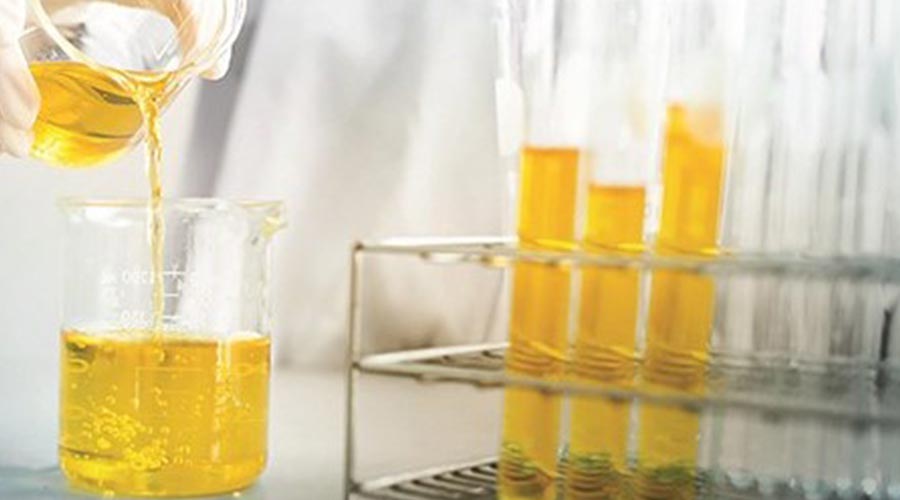Cannabis flower used to be the go-to when you wanted to medicate. Medical consumers can now choose multiple forms of concentrates, extracts, edibles, and other cannabis-infused products. Ethanol extraction is an increasingly popular cannabis extraction method used to make these products. Ethanol extraction is one of the three main types of extraction types, apart from butane and CO2 extraction.
While each producer uses different extraction methods based on efficiency, cost, and other factors, there’s a growing number of extractors using ethanol as a solvent to strip cannabis material from their desired chemical compounds. Ethanol extraction is a growing cannabis extraction method used for mass production of cannabis oils, extracts, and more infused products.
What is ethanol?
Ethanol (C2H6O), also known as ethyl alcohol or grain alcohol, is a colorless and volatile flammable liquid. Ethanol is used to make gasoline, beauty products, solvents, paints, and food additives. If you’ve consumed beer, wine, or spirits, you’ve likely had ethanol in your system. Ethanol has also been used to distill chemical compounds from botanicals like cannabis.
Ethanol is fermented from a variety of sources and distilled. Corn is the most commonly used feedstock for ethanol production. Other sources include wheat, barley, potatoes, sugar cane, and grain sorghum. Because ethanol is derived from plant material, it’s considered a renewable energy source.
According to the Food and Drug Administration (FDA), ethanol is considered a Class 3 solvent with low toxic risks when used in pharmaceutical manufacturing where the residual is under 5,000 parts per million (ppm) or 0.5%. Lab testing can ensure the ethanol-based extracts don’t contain high amounts of residual solvent. Certain states will have lower cut-off points when it comes to ethanol cannabis extraction. Regardless, ethanol extraction is known for its ability to leave very little to no residual solvent behind.
Ethanol cannabis extraction process

Manufacturers can work under warm or cold temperatures, each method coming with its own pros and cons. Using the Soxhlet technique, ethanol is boiled, condensed, and cooled down. This warm ethanol soaks the flower material in a quick process that leaves very little residue. This technique is typically used to make smaller batches of cannabis oil. Additionally, this method can convert THCA into THC, which activates cannabis’ chemical compounds. This may require more post-processing to remove unwanted matter.
Most ethanol extractors will use room temperature or cool conditions to extract specific cannabinoid acids like THCA and CBDA to make shatter crystals or other infused products. Using room and cool temperatures significantly reduce the levels of plant pigments and waxes in the final product, but also total cannabinoid recovery. Cooler temperatures, however, can be efficient at extracting THCA and CBDA because the temperatures preserve cannabinoids in their precursor acid forms.
During the extraction process, solvents (ethanol, butane, CO2) are mixed with the cannabis material to remove the cannabinoids and terpenes. Ethanol is considered a polar solvent that can dissolve cannabinoids, but also dissolves water-soluble molecules like chlorophyll. Leaving the chlorophyll in the final product can result in dark-colored and grassy-flavored extracts.
Ethanol and cannabis are mixed into a column (in a lab setting) at room or colder temperatures. Once the cannabinoids have been removed, processors remove the solvent through evaporation leaving behind pure cannabis oil. Post-processing is required to refine the extract from the organic plant material. Removing the chlorophyll removes the harsh, earthy flavor.
Benefits of ethanol extraction
Many manufacturers believe that ethanol has advantages over butane and carbon dioxide cannabis extraction methods. Ethanol extraction has its limitations, like any other solvent, but this extraction process all-but-removes the presence of residual solvents in the final product. Additionally, ethanol extraction gives producers the ability to remove cannabinoids and terpenes effectively to make products like THCA crystals.
In terms of cost, ethanol extraction can be a cost-effective option for many manufacturers who still want a big yield. Plus, ethanol extraction, when performed under the right conditions, is safe to work with. State-of-the-art ethanol extraction equipment can be automated and controlled through a digital interface with minimal intervention. Plus, closed-loop systems prevent any solvent leaks or fire hazards.
Compared to other extraction methods, ethanol extraction can have a lower startup cost in terms of equipment, labor, and throughput. More importantly, however, ethanol-based products retain a high purity (90%+). When warm extraction methods are used, decarboxylation can create ready-to-consume products.
Isolates and full-spectrum extracts
Ethanol extraction is a versatile cannabis extraction method that can reap cannabinoid isolates or full-spectrum extracts, depending on the intended use. For many extractors, it’s considered a “universal solvent” because it can dissolve chlorophyll and other plant matter as well as cannabinoids and terpenes. Full-extract cannabis oil will contain the plant’s original chemical profile without the harsh-tasting plant matter.
Ethanol extractions can also boil off terpenes and other matter leaving behind an odorless and potent cannabis oil. This type of oil is perfect for edible or tincture infusion to remove the cannabis taste that many users try to avoid. Ultimately, the type of products produced will determine what type of cannabis extraction is used.
Ethanol extraction is prized for its ability to create a safe and pure cannabis product without the risk of contaminants. In a controlled setting, ethanol can be a powerful and affordable solvent that creates highly potent extracts. These extracts can go into your cartridges, edibles, tinctures, topicals, and anything else you can think of.


Leave A Comment